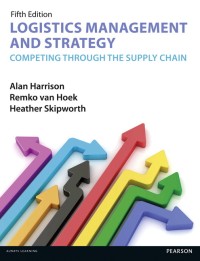Book
Logistics management and strategy Competing through the supply chain
Logistics has been emerging from Peter Drucker’s shadowy description as ‘the economy’s dark continent’ for some years.1 From its largely military origins, logistics has accelerated into becoming one of the key business issues of the day, presenting formidable challenges for managers and occupying some of the best minds. Its relatively slow route to this exalted position can be attributed to two causes. First, logistics is a cross-functional subject. In the past, it has rightly drawn on contributions from marketing, finance, operations and corporate strategy. Within the organisation, a more appropriate description would be a business process, cutting across functional boundaries yet with a contribution from each. Second, logistics extends beyond the boundaries of the organisation into the supply chain. Here, it engages with the complexities of synchronising the movement of materials and information between many business processes. The systems nature of logistics has proved a particularly difficult lesson to learn, and individual organisations still often think that they can optimise profit conditions for themselves by exploiting their partners in the supply chain. Often they can – in the short term. But winners in one area are matched by losers in another, and the losers are unable to invest or to develop the capabilities needed to keep the chain healthy in the long term. The emergence of logistics has therefore been dependent on the development of a cross-functional model of the organisation, and on an understanding of the need to integrate business processes across the supply network.
Ketersediaan
Informasi Detail
- Judul Seri
-
-
- No. Panggil
-
TXT LO HAR l
- Penerbit
- UK : Pearson Education Limited., 2002
- Deskripsi Fisik
-
xxv, 311p
- Bahasa
-
English
- ISBN/ISSN
-
978-0-273-71276-3
- Klasifikasi
-
LO
- Tipe Isi
-
-
- Tipe Media
-
-
- Tipe Pembawa
-
online resource
- Edisi
-
3rd edition
- Subjek
- Info Detail Spesifik
-
-
- Pernyataan Tanggungjawab
-
Harrison, Alan
Versi lain/terkait
Lampiran Berkas
Komentar
Anda harus masuk sebelum memberikan komentar

 Karya Umum
Karya Umum  Filsafat
Filsafat  Agama
Agama  Ilmu-ilmu Sosial
Ilmu-ilmu Sosial  Bahasa
Bahasa  Ilmu-ilmu Murni
Ilmu-ilmu Murni  Ilmu-ilmu Terapan
Ilmu-ilmu Terapan  Kesenian, Hiburan, dan Olahraga
Kesenian, Hiburan, dan Olahraga  Kesusastraan
Kesusastraan  Geografi dan Sejarah
Geografi dan Sejarah